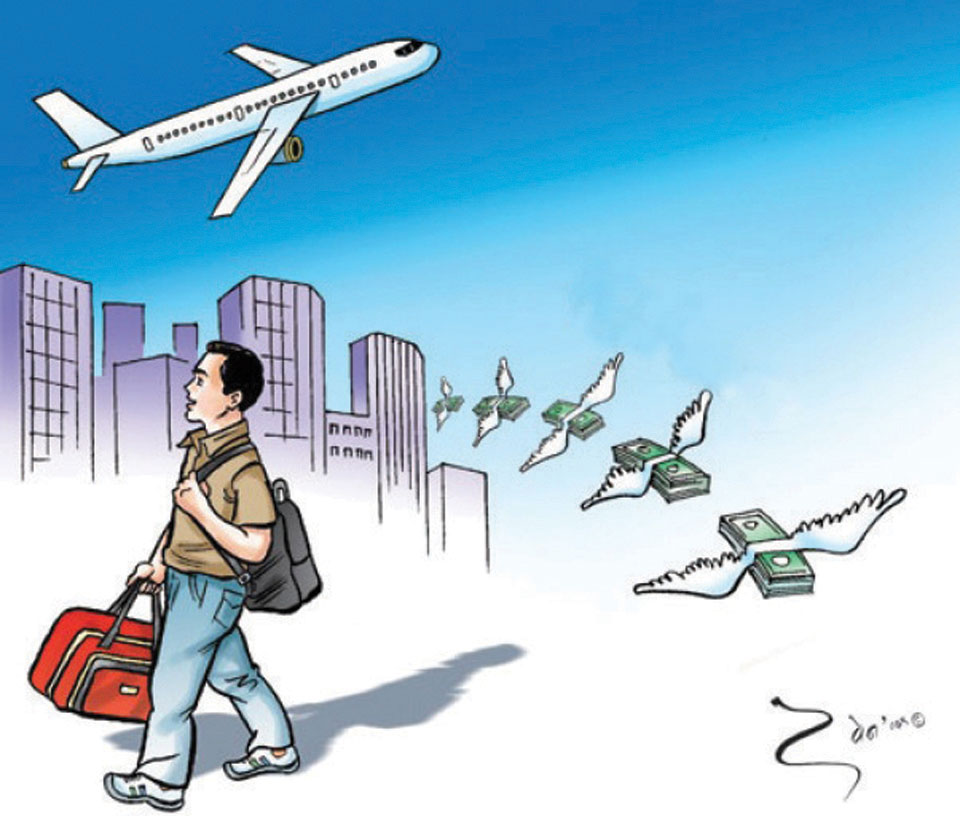
Our green cards were letting us stay back as much as we wanted and the US citizenship was in the pipeline. But we decided to come back. Will I be able to endure the growing up kids? Will I be able to hear a little more from my mother to come back? But to get citizenship, I’ll need to read the last two hundred pages of “The short version of US Immigration laws”…What do I do if I have to leave the country? Will I be able to take all my stuff along? What to do with my car? (Because I will need one back home too), what about all those belongings at home? Though we didn’t have any pets (Thank god, we didn’t get one), where should I opt for my kid’s schools, what do I do career-wise! …This is too complicated…I wish I was home now, basking in the winter sun, having makai, (popcorn) and guffing (chatting) with my sister and mother…
These were my last months in the US, churning my brain with how-to’s and what-if’s and desperately looking for options. I think these are the last few months of anyone who is planning to move back to their home town. With much noise and dissonance, it’s been a month now that I moved back from America to Nepal, along with the kids. Since the school sessions were about to commence in Kathmandu, I had to do huff and puff to find a good school and daycare for kids. Still going through the transitional phase, the decision was personal and I am not here to say why to return home, but rather how.
So thinking of returning back to Nepal for good? Let’s say you are thinking about coming home. But you haven’t decided when to. That’s alright. It just gives you time and if I have learned anything, as someone who was brought up in Nepal, you need time to get things done.
1. Keep in touch with friends and family
One way to avoid the inevitable information dump once your return home is to maintain regular contact with your friends and family. News from home will help you keep a sense of continuity, and will show the people back home that you may be having the time of your life out of the country. But you still care about the home. Even better, these days there are Facebook, Instagram, keep a blog or photo-journal while you’re away and share it with all your friends and family.
2. Get rid of unwanted stuff
I cannot insist on this more. The less you bring, the cheaper, better, and still faster the move will seem. I sold my furniture, my electronics, and my car. Of course, you have to be aware of scammers in online dealings.
Selling your car might be tricky. If you are going for a private sale vs dealer sale, you might get a better price. But then again, beware of pesky scammers. I also donated a lot of clothes, books, household items, since the airlines charge too much for extra bags. I somehow still managed to send a lot of items with my friends as they were traveling at the same time. Yes, please do the math before shipping
3. Transferring your money to Nepali bank accounts
The next thing, on your list, would be to get your hard earned, US Govt. taxed, money back home. These days there are many money transfer agents like thamel.com, xoom.com, muncha.com, and IME that transfer money in few hours and days. Prepare your Nepali citizenship card, (of course make as many copies, because you will need it everywhere) and your passport size photos (yes, multiple copies). A tip is to keep an eye out for a good day for the exchange rate in favor of Rupees and banks give higher rates for 100$ bill than $10 bill. Once you return home, be familiar with the term ‘KYC’ which is Know your Customer. And do take photos and citizenship copy to open a bank account. It is a process followed by a financial institution or an entity to collect the details to establish the identity of a client.
4. Managing the culture shock after arriving
Even if you grew up here, it still is a culture shock. Everything around seems to be chaotic and yet somehow functioning. The city isn’t as clean as the one you were living in. The roads have no lanes. No one gives pedestrians any right of way. Not claiming to pass judgment, I think what you need to prepare yourself for, is a difference. Don’t expect the same kind of lifestyle. That would be ridiculous. A few months may go by before you start seeing a homegrown order in that chaos. Things just function differently here. You don’t check online, for the plumber or electrician or the handyman, like you used to. You ask that guy who knows the concerned problem. And soon you will be a phone call away from any desired service. I recommend doing some reading on reverse culture shock, and learning from others’ experiences ahead of time, just to prepare yourself mentally for what you may go through.
5. Involve your children
Yes! Please involve your children in discussions about the move. Don’t assume they will automatically adjust to their ‘home’ country. Most kids will have spent their formative years overseas and will not have the cultural references an adult has with regards to ‘home’. I told my son about the move right from the start, we started to prepare, yet he was like, “Can we not go, because I am going to miss my friends a lot”. The culture and unwritten social rules of the ‘home country’ appear not to be so clear to the kids. They will feel lonely at times and they will also feel like an outsider who hasn’t got a clue about what’s happening around them! They look and talk like a local, but they are not. This may come as an ugly surprise. In this phase, there is a strong urge to be socially accepted and be a successful youngster.
6. Finding a job after returning
Together with a group of people, we have started a campaign called, Return to Nepal- Initiative aka, Nepal Farkaun Maha Abhiyaan, a non-political campaign, where we provide the platform to people who want to return back, helping the country reverse the brain-drain in some way. Unlike the old days, there are online job portals. But people still look for job vacancies in daily newspapers. The fact that Nepal is full of problems basically translates to quite a few opportunities in making an impact. Frankly, there is nothing amazingly different about job hunts in Nepal. However, my experience suggests there is still a strong gain to be made from networking. Passing on your resume to people you know helps. Employee referrals help. So, even if you don’t like that guy from college, the one who used to laugh at his own jokes, now working in that company you like, you send a friendly poke on facebook and ask him how he is doing. Academics need to become visible here. The competition is getting tougher. People here are facing it every day. Offers are few and communication is minimal. You might get lucky and get a rejection letter but don’t count on it. Most places don’t bother with letters. But the rule of thumb is, no news is probably bad news. After you do get a job, don’t start comparing your salary, in the US, to Nepal. That’s fatal and more so, pointless. Compare it with the Nepalese pay scales and see where it fits in your lifestyle. So be prepared for some frustration.
Since it’s still early for me to analyze many things, what I can say is- ‘moving is harrowing’. It is harrowing enough when you move houses, let alone continents, but if your end goal is what drives you to move, then it is just worth it. Having an idea, of the steps to take is a good place to start. It took me about a year from the time I decided I would move to when I actually did. It was hard scavenging for everything’s information, that too all on my own. In the end, moving back is opting for a journey that will be painful, delightful, unexpected, harsh at times- but above all transformative. It will force you to deconstruct your so-perfect self and to build empathy with an entire nation. Embrace it.






Leave A Comment